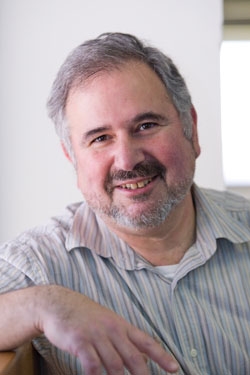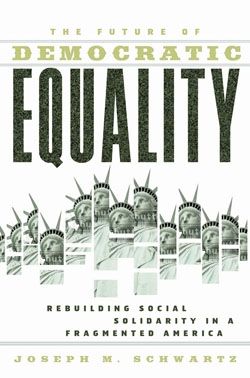Economic inequality presaged current recession
Temple political scientist brings solidarity back in new book
As a leading progressive political theorist and as a current vice chair of the Democratic Socialists of America, Joseph Schwartz has received his share of attention and criticism from the right. Most recently circulating on the blogosphere —“Joseph Schwartz and Obama go way back.”
“That was the ludicrous, widely circulated claim in a recent right-wing blog attack of President Obama as a ‘closet socialist,’” explained Schwartz, associate professor of political science at Temple University’s College of Liberal Arts.
Cited as evidence for the charge was a 1996 Democratic Socialists of America forum at the University of Chicago at which Schwartz shared the podium with then Illinois State Senate candidate Barack Obama.
“That’s true, but the idea that our moderately liberal new president takes advice from me is quite amusing, no? I’m quite sure he does not even remember who I am,” said Schwartz.
But it is not just the politics of the right, as one might expect, that Schwartz challenges in his new book, The Future of Democratic Equality: Rebuilding Social Solidarity in a Fragmented America (Routledge Press, 2009). Schwartz also takes on many of the standard views of self-proclaimed “radical” and “postmodern” political theorists.
His book, which was supported by a fellowship from the National Endowment for the Humanities, examines the dramatic increase in economic inequality in the United States and the failure of our intellectual culture and politics to address the situation.
He argues that over the past 30 years most liberal and radical scholars shifted their focus away from interrogating social inequality to criticizing the liberal tradition for being inattentive to the role of difference and identity in social life. This turn in political theory was useful for raising awareness of gender, racial, and sexual oppression, said Schwartz, but it led many academics to forget about the role of “solidarity across differences” or a shared sense of common humanity in redressing inequality.
“Much of the growth of inequality in the U.S. has distinct political, not structural economic causes,” said Schwartz. In The Future of Democratic Equality, Schwartz presciently contends that our growing global economic inequality is likely to produce a prolonged economic crisis.
Now as the stock market remains unsteady and global economies are in free fall, many are comparing the current state of the economy to the 1930s. In fact, according to Schwartz, even before the housing bubble burst and before the bailouts of banks and insurers, the concentration of income and wealth in the U.S. had reached extremes of inequality last witnessed during the Great Depression.
Today, the top one percent of U.S. households owns 34.3 percent of the nation’s private wealth. And, he said, several new studies show that parental income is a better indicator of whether someone will be rich or poor in America than it is in Canada or Europe.
This kind of inequality is unacceptable, said Schwartz. “If you believe in democracy, you have to believe in equality. A child’s life chances should not depend on the position of his or her parents.”
According to Schwartz, the absence of any sense of responsibility on the part of suburban Americans for the structural barriers to equality confronted by inner city African American and Latino communities and poor rural whites illustrates how recognition of difference without a commitment to solidarity across difference can disempower subordinate communities.
Put simply, reducing inequality will require solidarity, he said.
Raised in a working class Bronx neighborhood by a pair of Keynesian economists (who chose to live near his immigrant working class maternal grandmother), Schwartz was acutely aware of class differences.
“Class and race diverse neighborhoods, like the one I grew up in, are mostly a thing of the past. One reason why many Americans can’t think straight today about race and class is that our society is more racially and class stratified than it was 40 years ago,” said Schwartz.
“So, while I had a comfortable middle class childhood, I was always acutely aware that many of my less affluent friends did not have the opportunities I had,” explained Schwartz.
Schwartz admits that too much of the scholarship in his field can only be read by advanced graduate students, but says he settled into political theory because, at its best, it helps those who study it explore possibilities of democratizing power relations.
“Most political theorists tend to spend a lot of time rendering the transparent opaque,” he joked. “I hope my scholarship and teaching, in its own modest way, renders the opacity of such ideological myths as the United States being ‘the most just society on earth’ transparently false.”
Schwartz is a past winner of both the College of Liberal Arts Award for Outstanding Teaching and the University’s Lindback Prize for Teaching Excellence. His first book, The Permanence of the Political (Princeton University Press), was supported by a prestigious fellowship from the American Council of Learned Societies and won the North American Society for Social Philosophy prize for the best book published in 1995 in social and political philosophy.
“I hope what I write helps develop not only a vision of a more just society than our own, but also feasible ways that ordinary people might organize to achieve a more just America and world,” he said.

